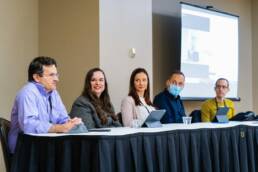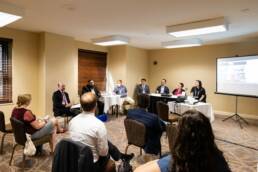

Network and share career advice with your colleagues on a Professional Development Roundtable at the 2024 MPSA Conference!
Call for Professional Development Roundtable Participants
The MPSA is currently seeking participants for Professional Development Roundtables at the 2024 conference. The topics for the 2024 roundtables are listed below. Volunteers can sign up to participate here.
All volunteers will be reviewed prior to placement on the program. Roundtables that garner enough participants will be scheduled as part of the conference programming within the Professional Development section.
The Professional Development Section aims to facilitate open conversations and informational sessions around specific topics related to careers in political science, and the political science profession in general. The Professional Development Roundtables are a valued tradition of the MPSA Annual Conference, providing a forum for scholars at all career stages to share ideas, experiences, expertise, and other resources with colleagues in a conversational setting. If you would like to organize a roundtable within the Professional Development Section, please contact Lewis Hoss at hoss@mpsanet.org.
2024 Professional Development Roundtables
The following roundtables are confirmed for the 2024 conference (scheduling details are forthcoming):
- Being an MPSA Wiki Scholar: Sharing Political Expertise on Wikipedia
- Journals, Peer Review, and the Discipline of Political Science
- Political Science and the Liberal Arts: A Time for Reaffirmation or Retrenchment?
- Public-Facing Political Science
The MPSA is currently seeking volunteers to participate on the following roundtables (interested participants can sign up here):
Career
- Balancing Work & Life as an Academic
- Being Faculty at a Community College
- Building a Professional Network
- Building Healthy Political Science Departments
- Faculty Governance and Union Organizing
- Navigating the Tenure Process
- Transitioning from Faculty to Administration
- What to Expect at Your First Tenure-Track Job
Job Placement
- Alt-Academic and Non-Academic Careers for Political Science PhDs
- Building a Competitive Job Market Portfolio
- How to Approach the Job Interview
- Making the Most of Your Postdoc Experience
- Navigating the Job Market as an International Candidate
Public Engagement
- How to be Heard by Policy Makers
- Mixing Academics and Practical Politics
- Working with the Media
Publishing
- Advice from Political Science Journal Editors
- Getting Your Book Published: Advice from Acquisitions Editors
- Getting Your Book Published: Advice from Authors
Research
- Applying for Grants and Funding Opportunities
- Buidling a Productive Research Agenda
- Pursuing Interdisciplinary Research in Political Science
Students
- How to Survive (and Thrive) in Graduate School
- What They Don’t Teach You in Grad School
Teaching
- Approaches to Teaching Introductory Courses
- Approaches to Teaching Undergraduate Research Methods
- Designing New Courses
- Innovative Teaching Methods and Techniques
- Strategies for Enhancing Student Engagement
- The Challenges and Opportunities of AI
- Using Simulations and Games in the Classroom
